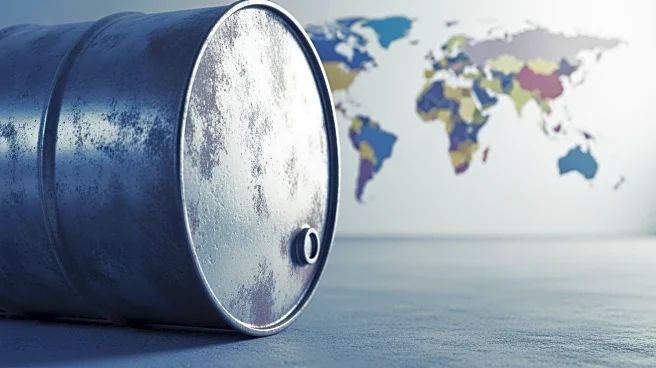What's Happening?
The United States has recently imposed stringent sanctions on Russia's energy sector, specifically targeting major oil companies Lukoil and Rosneft. These sanctions have resulted in significant changes
in the trade dynamics of Russian Urals crude oil, particularly in India. Discounts for Urals crude at Indian ports have tripled since August, as U.S. sanctions deter key buyers from purchasing Moscow-supplied oil. Despite these sanctions, Russia's oil exports from western ports remain near peak levels, supported by OPEC+ output allowances and domestic refinery outages caused by Ukrainian drone strikes. Urals cargoes for December delivery are trading at discounts of $5–$6 a barrel to dated Brent, a substantial increase from the $1–$2 discounts seen in August.
Why It's Important?
The increased discounts on Russian Urals crude in India highlight the impact of U.S. sanctions on global oil trade dynamics. These sanctions are part of broader efforts to weaken Russia's economic capabilities, particularly its ability to fund its military operations in Ukraine. The shift in trade patterns, with Indian refiners suspending purchases, underscores the effectiveness of these sanctions in redirecting global oil flows. This development could lead to increased pressure on Russia's economy, as it struggles to maintain revenue from its energy exports. Additionally, the situation may influence global oil prices and affect energy markets, particularly in Asia, where Russian oil has been a significant feedstock.
What's Next?
As the deadline for companies to wind down dealings with Lukoil and Rosneft approaches, further reductions in Russian oil exports to India are expected. Indian refiners, including Reliance Industries, have already begun suspending imports of Russian crude. This shift may lead to increased demand for alternative sources of crude oil, potentially affecting global oil prices and trade routes. The ongoing geopolitical tensions and sanctions could prompt further strategic adjustments by Russia and its trading partners, as they navigate the evolving landscape of international energy trade.









